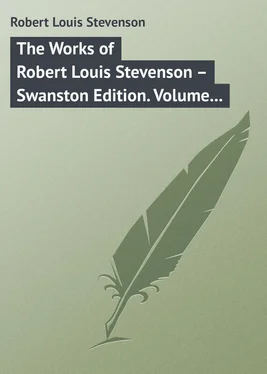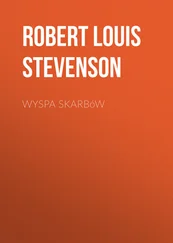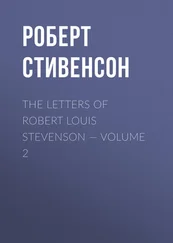Robert Stevenson - The Works of Robert Louis Stevenson – Swanston Edition. Volume 23
Здесь есть возможность читать онлайн «Robert Stevenson - The Works of Robert Louis Stevenson – Swanston Edition. Volume 23» — ознакомительный отрывок электронной книги совершенно бесплатно, а после прочтения отрывка купить полную версию. В некоторых случаях можно слушать аудио, скачать через торрент в формате fb2 и присутствует краткое содержание. ISBN: , Жанр: foreign_prose, на английском языке. Описание произведения, (предисловие) а так же отзывы посетителей доступны на портале библиотеки ЛибКат.
- Название:The Works of Robert Louis Stevenson – Swanston Edition. Volume 23
- Автор:
- Жанр:
- Год:неизвестен
- ISBN:http://www.gutenberg.org/ebooks/30894
- Рейтинг книги:3 / 5. Голосов: 1
-
Избранное:Добавить в избранное
- Отзывы:
-
Ваша оценка:
- 60
- 1
- 2
- 3
- 4
- 5
The Works of Robert Louis Stevenson – Swanston Edition. Volume 23: краткое содержание, описание и аннотация
Предлагаем к чтению аннотацию, описание, краткое содержание или предисловие (зависит от того, что написал сам автор книги «The Works of Robert Louis Stevenson – Swanston Edition. Volume 23»). Если вы не нашли необходимую информацию о книге — напишите в комментариях, мы постараемся отыскать её.
The Works of Robert Louis Stevenson – Swanston Edition. Volume 23 — читать онлайн ознакомительный отрывок
Ниже представлен текст книги, разбитый по страницам. Система сохранения места последней прочитанной страницы, позволяет с удобством читать онлайн бесплатно книгу «The Works of Robert Louis Stevenson – Swanston Edition. Volume 23», без необходимости каждый раз заново искать на чём Вы остановились. Поставьте закладку, и сможете в любой момент перейти на страницу, на которой закончили чтение.
Интервал:
Закладка:
But this year the biting Oriental blasts, the howling tempests, and the general ailments of the human race have been successfully braved by yours truly.
Does not this deserve remuneration?
I appeal to your charity, I appeal to your generosity, I appeal to your justice, I appeal to your accounts, I appeal, in fine, to your purse.
My sense of generosity forbids the receipt of more – my sense of justice forbids the receipt of less – than half-a-crown. – Greeting from, Sir, your most affectionate and needy son,
R. Stevenson.From 1864 to 1867 Stevenson’s education was conducted chiefly at Mr. Thomson’s private school in Frederick Street, Edinburgh, and by private tutors in various places to which he travelled for his own or his parents’ health. These travels included frequent visits to such Scottish health resorts as Bridge of Allan, Dunoon, Rothesay, North Berwick, Lasswade, and Peebles, and occasional excursions with his father on his nearer professional rounds to the Scottish coasts and lighthouses. From 1867 the family life became more settled between Edinburgh and Swanston Cottage, Lothianburn, a country home in the Pentlands which Mr. Stevenson first rented in that year, and the scenery and associations of which sank deeply into the young man’s spirit, and vitally affected his after thoughts and his art.
By this time Louis Stevenson seemed to show signs of outgrowing his early infirmities of health. He was a lover, to a degree even beyond his strength, of outdoor life and exercise (though not of sports), and it began to be hoped that as he grew up he would be fit to enter the family profession of civil engineer. He was accordingly entered as a student at Edinburgh University, and for several winters attended classes there with such regularity as his health and inclinations permitted. This was in truth but small. The mind on fire with its own imaginations, and eager to acquire its own experiences in its own way, does not take kindly to the routine of classes and repetitions, nor could the desultory mode of schooling enforced upon him by ill-health answer much purpose by way of discipline. According to his own account he was at college, as he had been at school, an inveterate idler and truant. But outside the field of school and college routine he showed an eager curiosity and activity of mind. “He was of a conversable temper,” so he says of himself, “and insatiably curious in the aspects of life, and spent much of his time scraping acquaintance with all classes of men and womenkind.” Of one class indeed, and that was his own, he had soon had enough, at least in so far as it was to be studied at the dinners, dances, and other polite entertainments of ordinary Edinburgh society. Of these he early wearied. At home he made himself pleasant to all comers, but for his own resort chose out a very few houses, mostly those of intimate college companions, into which he could go without constraint, and where his inexhaustible flow of poetic, imaginative, and laughing talk seems generally to have rather puzzled his hearers than impressed them. On the other hand, during his endless private rambles and excursions, whether among the streets and slums, the gardens and graveyards of the city, or farther afield among the Pentland hills or on the shores of Forth, he was never tired of studying character and seeking acquaintance among the classes more nearly exposed to the pinch and stress of life.
In the eyes of anxious elders, such vagrant ways naturally take on the colours of idleness and a love of low company. Stevenson was, however, in his own fashion an eager student of books as well as of man and nature. He read precociously and omnivorously in the belles-lettres , including a very wide range of English poetry, fiction, and essays, and a fairly wide range of French; and was a genuine student of Scottish history, especially from the time of the persecutions down, and to some extent of history in general. The art of literature was already his private passion, and something within him even already told him that it was to be his life’s work. On all his truantries he went pencil and copybook in hand, trying to fit his impression of the scene to words, to compose original rhymes, tales, dialogues, and dramas, or to imitate the style and cadences of the author he at the moment preferred. For three or four years, nevertheless, he tried dutifully, if half-heartedly, to prepare himself for the family profession. In 1868, the year when the following correspondence opens, he went to watch the works of the firm in progress first at Anstruther on the coast of Fife, and afterwards at Wick. In 1869 he made the tour of the Orkneys and Shetlands on board the steam yacht of the Commissioners of Northern Lights, and in 1870 the tour of the Western Islands, preceded by a stay on the isle of Earraid, where the works of the Dhu Heartach lighthouse were then in progress. He was a favourite, although a very irregular, pupil of the professor of engineering, Fleeming Jenkin, whose friendship and that of Mrs. Jenkin were of great value to him, and whose life he afterwards wrote; and must have shown some aptitude for the family calling, inasmuch as in 1871 he received the silver medal of the Edinburgh Society of Arts for a paper on a suggested improvement in lighthouse apparatus. The outdoor and seafaring parts of an engineer’s life were in fact wholly to his taste. But he looked instinctively at the powers and phenomena of waves and tide, of storm and current, reef, cliff, and rock, with the eye of the poet and artist, and not those of the practician and calculator. For desk work and office routine he had an unconquerable aversion; and his physical powers, had they remained at their best, must have proved quite unequal to the workshop training necessary to the practical engineer. Accordingly in 1871 it was agreed, not without natural reluctance on his father’s part, that he should give up the hereditary vocation and read for the bar: literature, on which his heart was set, and in which his early attempts had been encouraged, being held to be by itself no profession, or at least one altogether too irregular and undefined. For the next several years, therefore, he attended law classes instead of engineering and science classes in the University, giving to the subject a certain amount of serious, although fitful, attention until he was called to the bar in 1875.
So much for the course of Stevenson’s outward life during these days at Edinburgh. To tell the story of his inner life would be a far more complicated task, and cannot here be attempted even briefly. The ferment of youth was more acute and more prolonged in him than in most men even of genius. In the Introduction I have tried to give some notion of the many various strains and elements which met in him, and which were in these days pulling one against another in his half-formed being, at a great expense of spirit and body. Add the storms, which from time to time attacked him, of shivering repulsion from the climate and conditions of life in the city which he yet deeply and imaginatively loved; the moods of spiritual revolt against the harsh doctrines of the creed in which he had been brought up, and to which his parents were deeply, his father even passionately, attached; the seasons of temptation, to which he was exposed alike by temperament and circumstance, to seek solace among the crude allurements of the city streets.
In the later and maturer correspondence which will appear in these volumes, the agitations of the writer’s early days are often enough referred to in retrospect. In the boyish letters to his parents, which make up the chief part of this first section, they naturally find no expression at all; nor will these letters be found to differ much in any way from those of any other lively and observant lad who is also something of a reader and has some natural gift of writing. At the end of the section I have indeed printed one cry of the heart, written not to his parents, but about them, and telling of the strain which matters of religious difference for a while brought into his home relations. The attachment between the father and son from childhood was exceptionally strong. But the father was staunchly wedded to the hereditary creeds and dogmas of Scottish Calvinistic Christianity; while the course of the young man’s reading, with the spirit of the generation in which he grew up, had loosed him from the bonds of that theology, and even of dogmatic Christianity in general, and had taught him to respect all creeds alike as expressions of the cravings and conjectures of the human spirit in face of the unsolved mystery of things, rather than to cling to any one of them as a revelation of ultimate truth. The shock to the father was great when his son’s opinions came to his knowledge; and there ensued a time of extremely painful discussion and private tension between them. In due time this cloud upon a family life otherwise very harmonious and affectionate passed quite away. But the greater the love, the greater the pain; when I first knew Stevenson this trouble gave him no peace, and it has left a strong trace upon his mind and work. See particularly the parable called “The House of Eld,” in his collection of Fables , and the many studies of difficult paternal and filial relations which are to be found in The Story of a Lie , The Misadventures of John Nicholson , The Wrecker , and Weir of Hermiston .
Читать дальшеИнтервал:
Закладка:
Похожие книги на «The Works of Robert Louis Stevenson – Swanston Edition. Volume 23»
Представляем Вашему вниманию похожие книги на «The Works of Robert Louis Stevenson – Swanston Edition. Volume 23» списком для выбора. Мы отобрали схожую по названию и смыслу литературу в надежде предоставить читателям больше вариантов отыскать новые, интересные, ещё непрочитанные произведения.
Обсуждение, отзывы о книге «The Works of Robert Louis Stevenson – Swanston Edition. Volume 23» и просто собственные мнения читателей. Оставьте ваши комментарии, напишите, что Вы думаете о произведении, его смысле или главных героях. Укажите что конкретно понравилось, а что нет, и почему Вы так считаете.










